Organisational Behaviour Report: Iceland Food Ltd Analysis
VerifiedAdded on 2021/02/18
|12
|3581
|236
Report
AI Summary
This report provides an in-depth analysis of organisational behaviour within Iceland Food Ltd, a British supermarket chain. It explores the impact of power, culture, and politics on individual and team behaviour, utilizing Handy's culture model to examine power, role, task, and person cultures. The report delves into French and Raven's concept of power, including legitimate, reward, coercive, referent, and expert power, as well as the influence of organisational politics. Furthermore, it examines motivation theories, including content (Maslow's Hierarchy of Needs, Herzberg's Theory) and process theories (Vroom's Expectancy Theory, Adams' Equity Theory), to understand how Iceland Food Ltd can enhance employee motivation and achieve its goals. The report concludes by discussing different team dynamics and the application of organisational behaviour philosophies.
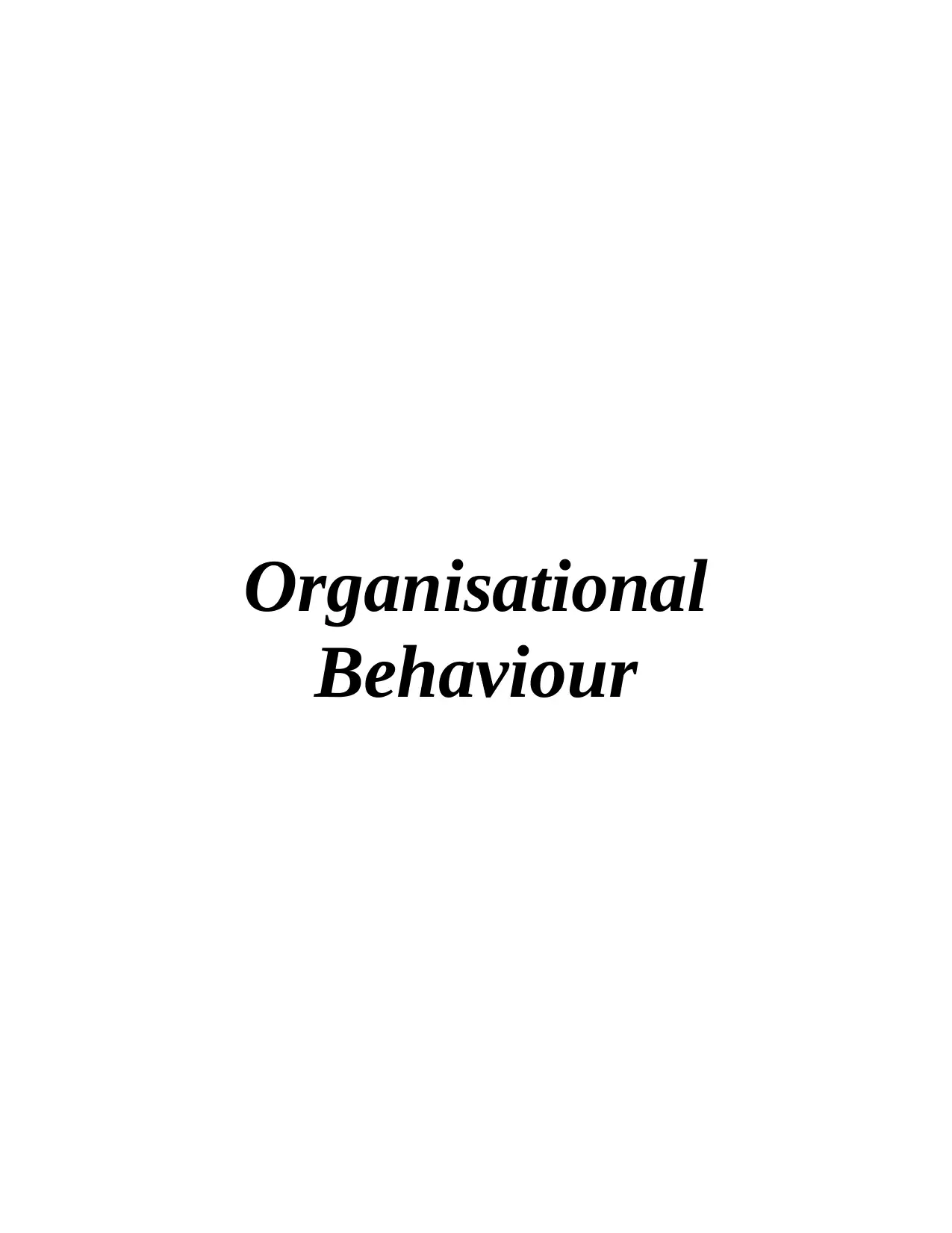
Organisational
Behaviour
Behaviour
Paraphrase This Document
Need a fresh take? Get an instant paraphrase of this document with our AI Paraphraser
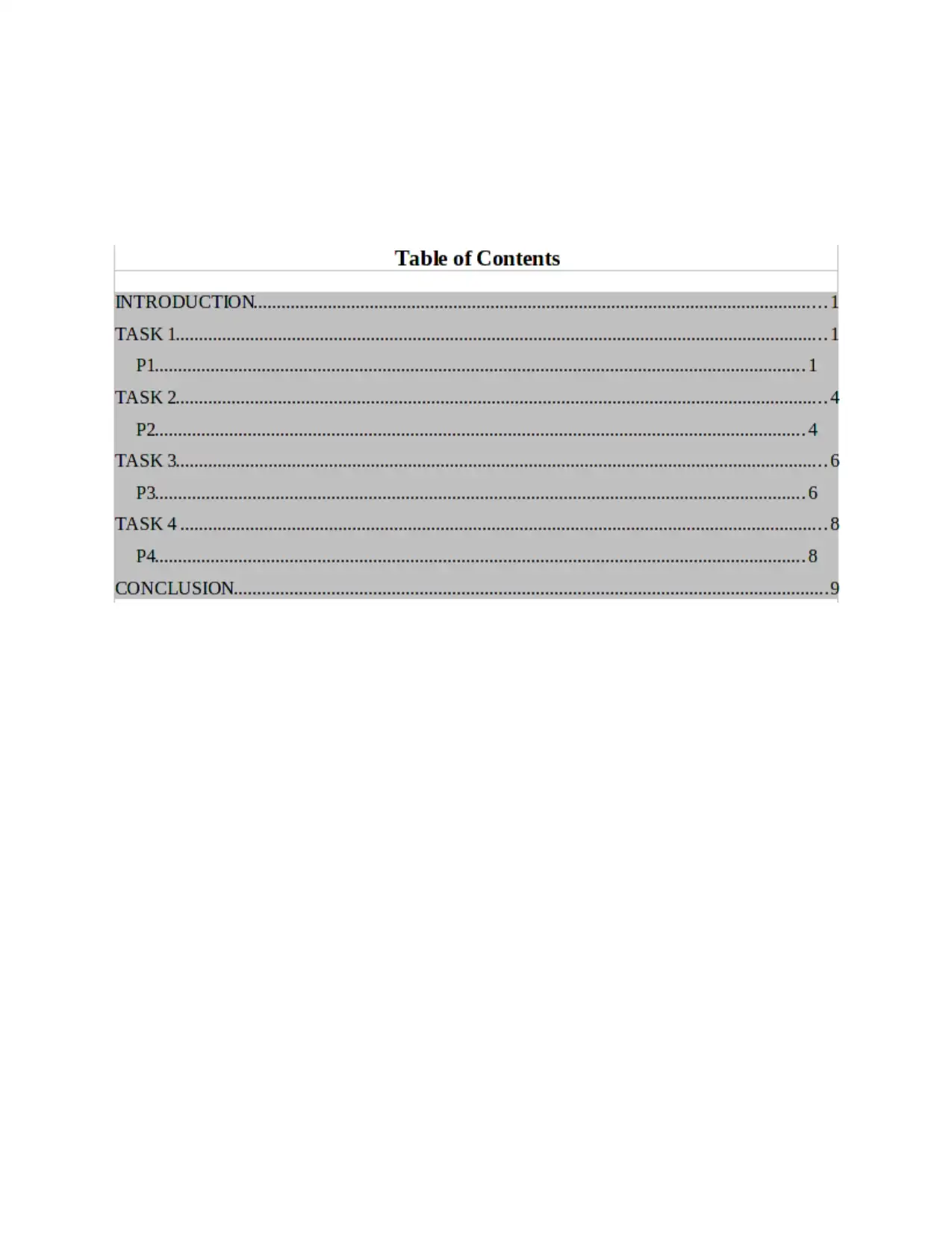
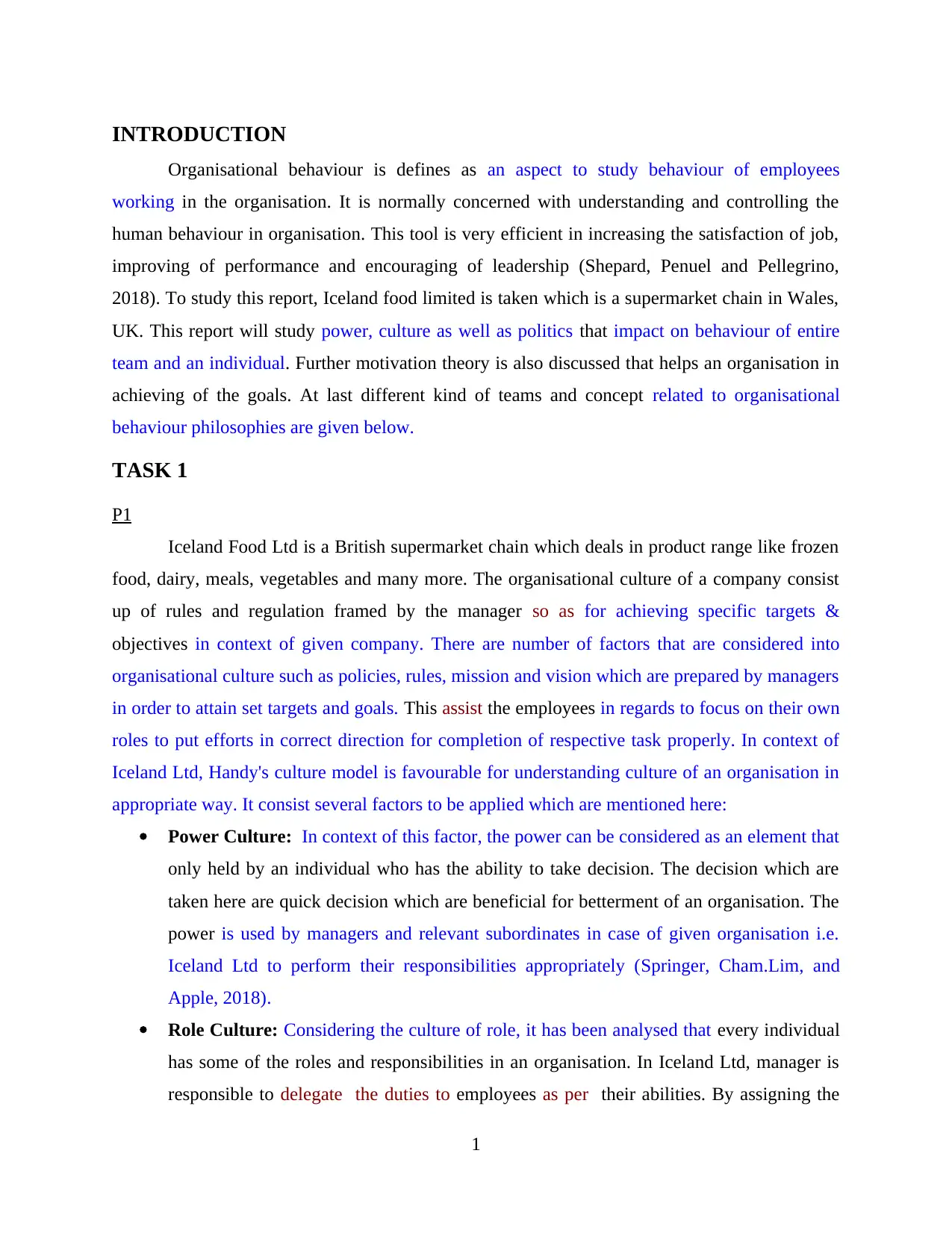
INTRODUCTION
Organisational behaviour is defines as an aspect to study behaviour of employees
working in the organisation. It is normally concerned with understanding and controlling the
human behaviour in organisation. This tool is very efficient in increasing the satisfaction of job,
improving of performance and encouraging of leadership (Shepard, Penuel and Pellegrino,
2018). To study this report, Iceland food limited is taken which is a supermarket chain in Wales,
UK. This report will study power, culture as well as politics that impact on behaviour of entire
team and an individual. Further motivation theory is also discussed that helps an organisation in
achieving of the goals. At last different kind of teams and concept related to organisational
behaviour philosophies are given below.
TASK 1
P1
Iceland Food Ltd is a British supermarket chain which deals in product range like frozen
food, dairy, meals, vegetables and many more. The organisational culture of a company consist
up of rules and regulation framed by the manager so as for achieving specific targets &
objectives in context of given company. There are number of factors that are considered into
organisational culture such as policies, rules, mission and vision which are prepared by managers
in order to attain set targets and goals. This assist the employees in regards to focus on their own
roles to put efforts in correct direction for completion of respective task properly. In context of
Iceland Ltd, Handy's culture model is favourable for understanding culture of an organisation in
appropriate way. It consist several factors to be applied which are mentioned here:
Power Culture: In context of this factor, the power can be considered as an element that
only held by an individual who has the ability to take decision. The decision which are
taken here are quick decision which are beneficial for betterment of an organisation. The
power is used by managers and relevant subordinates in case of given organisation i.e.
Iceland Ltd to perform their responsibilities appropriately (Springer, Cham.Lim, and
Apple, 2018).
Role Culture: Considering the culture of role, it has been analysed that every individual
has some of the roles and responsibilities in an organisation. In Iceland Ltd, manager is
responsible to delegate the duties to employees as per their abilities. By assigning the
1
Organisational behaviour is defines as an aspect to study behaviour of employees
working in the organisation. It is normally concerned with understanding and controlling the
human behaviour in organisation. This tool is very efficient in increasing the satisfaction of job,
improving of performance and encouraging of leadership (Shepard, Penuel and Pellegrino,
2018). To study this report, Iceland food limited is taken which is a supermarket chain in Wales,
UK. This report will study power, culture as well as politics that impact on behaviour of entire
team and an individual. Further motivation theory is also discussed that helps an organisation in
achieving of the goals. At last different kind of teams and concept related to organisational
behaviour philosophies are given below.
TASK 1
P1
Iceland Food Ltd is a British supermarket chain which deals in product range like frozen
food, dairy, meals, vegetables and many more. The organisational culture of a company consist
up of rules and regulation framed by the manager so as for achieving specific targets &
objectives in context of given company. There are number of factors that are considered into
organisational culture such as policies, rules, mission and vision which are prepared by managers
in order to attain set targets and goals. This assist the employees in regards to focus on their own
roles to put efforts in correct direction for completion of respective task properly. In context of
Iceland Ltd, Handy's culture model is favourable for understanding culture of an organisation in
appropriate way. It consist several factors to be applied which are mentioned here:
Power Culture: In context of this factor, the power can be considered as an element that
only held by an individual who has the ability to take decision. The decision which are
taken here are quick decision which are beneficial for betterment of an organisation. The
power is used by managers and relevant subordinates in case of given organisation i.e.
Iceland Ltd to perform their responsibilities appropriately (Springer, Cham.Lim, and
Apple, 2018).
Role Culture: Considering the culture of role, it has been analysed that every individual
has some of the roles and responsibilities in an organisation. In Iceland Ltd, manager is
responsible to delegate the duties to employees as per their abilities. By assigning the
1
⊘ This is a preview!⊘
Do you want full access?
Subscribe today to unlock all pages.

Trusted by 1+ million students worldwide
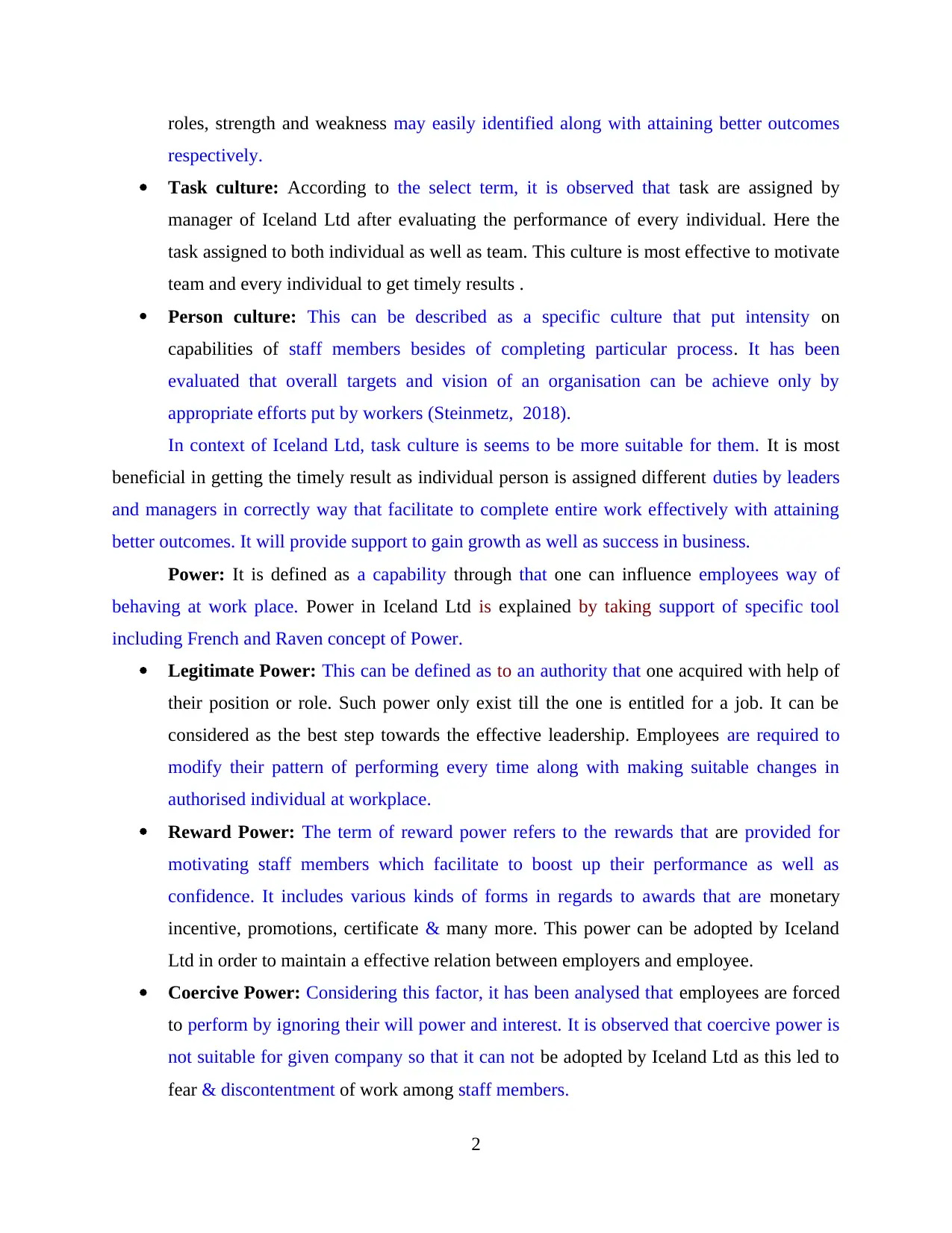
roles, strength and weakness may easily identified along with attaining better outcomes
respectively.
Task culture: According to the select term, it is observed that task are assigned by
manager of Iceland Ltd after evaluating the performance of every individual. Here the
task assigned to both individual as well as team. This culture is most effective to motivate
team and every individual to get timely results .
Person culture: This can be described as a specific culture that put intensity on
capabilities of staff members besides of completing particular process. It has been
evaluated that overall targets and vision of an organisation can be achieve only by
appropriate efforts put by workers (Steinmetz, 2018).
In context of Iceland Ltd, task culture is seems to be more suitable for them. It is most
beneficial in getting the timely result as individual person is assigned different duties by leaders
and managers in correctly way that facilitate to complete entire work effectively with attaining
better outcomes. It will provide support to gain growth as well as success in business.
Power: It is defined as a capability through that one can influence employees way of
behaving at work place. Power in Iceland Ltd is explained by taking support of specific tool
including French and Raven concept of Power.
Legitimate Power: This can be defined as to an authority that one acquired with help of
their position or role. Such power only exist till the one is entitled for a job. It can be
considered as the best step towards the effective leadership. Employees are required to
modify their pattern of performing every time along with making suitable changes in
authorised individual at workplace.
Reward Power: The term of reward power refers to the rewards that are provided for
motivating staff members which facilitate to boost up their performance as well as
confidence. It includes various kinds of forms in regards to awards that are monetary
incentive, promotions, certificate & many more. This power can be adopted by Iceland
Ltd in order to maintain a effective relation between employers and employee.
Coercive Power: Considering this factor, it has been analysed that employees are forced
to perform by ignoring their will power and interest. It is observed that coercive power is
not suitable for given company so that it can not be adopted by Iceland Ltd as this led to
fear & discontentment of work among staff members.
2
respectively.
Task culture: According to the select term, it is observed that task are assigned by
manager of Iceland Ltd after evaluating the performance of every individual. Here the
task assigned to both individual as well as team. This culture is most effective to motivate
team and every individual to get timely results .
Person culture: This can be described as a specific culture that put intensity on
capabilities of staff members besides of completing particular process. It has been
evaluated that overall targets and vision of an organisation can be achieve only by
appropriate efforts put by workers (Steinmetz, 2018).
In context of Iceland Ltd, task culture is seems to be more suitable for them. It is most
beneficial in getting the timely result as individual person is assigned different duties by leaders
and managers in correctly way that facilitate to complete entire work effectively with attaining
better outcomes. It will provide support to gain growth as well as success in business.
Power: It is defined as a capability through that one can influence employees way of
behaving at work place. Power in Iceland Ltd is explained by taking support of specific tool
including French and Raven concept of Power.
Legitimate Power: This can be defined as to an authority that one acquired with help of
their position or role. Such power only exist till the one is entitled for a job. It can be
considered as the best step towards the effective leadership. Employees are required to
modify their pattern of performing every time along with making suitable changes in
authorised individual at workplace.
Reward Power: The term of reward power refers to the rewards that are provided for
motivating staff members which facilitate to boost up their performance as well as
confidence. It includes various kinds of forms in regards to awards that are monetary
incentive, promotions, certificate & many more. This power can be adopted by Iceland
Ltd in order to maintain a effective relation between employers and employee.
Coercive Power: Considering this factor, it has been analysed that employees are forced
to perform by ignoring their will power and interest. It is observed that coercive power is
not suitable for given company so that it can not be adopted by Iceland Ltd as this led to
fear & discontentment of work among staff members.
2
Paraphrase This Document
Need a fresh take? Get an instant paraphrase of this document with our AI Paraphraser
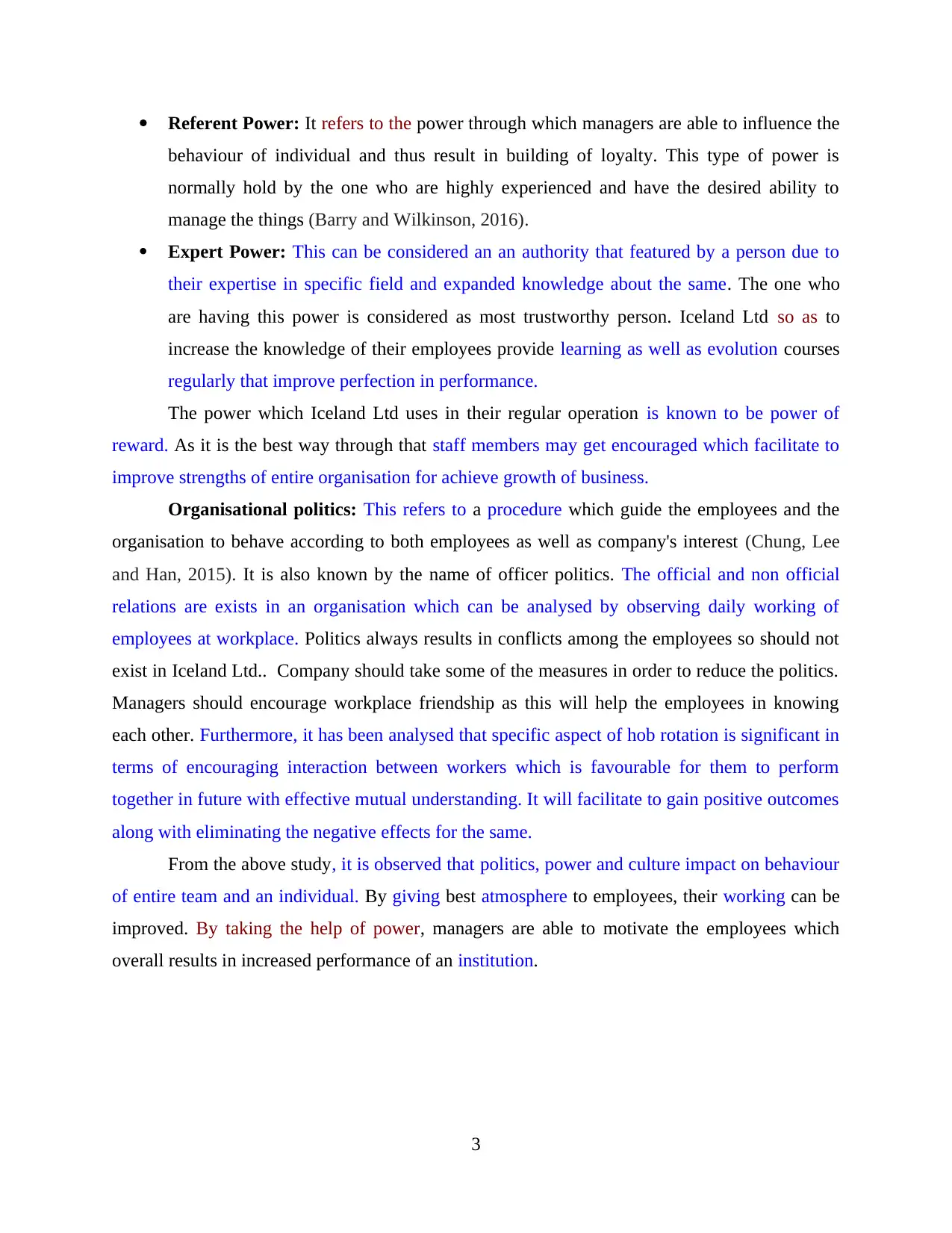
Referent Power: It refers to the power through which managers are able to influence the
behaviour of individual and thus result in building of loyalty. This type of power is
normally hold by the one who are highly experienced and have the desired ability to
manage the things (Barry and Wilkinson, 2016).
Expert Power: This can be considered an an authority that featured by a person due to
their expertise in specific field and expanded knowledge about the same. The one who
are having this power is considered as most trustworthy person. Iceland Ltd so as to
increase the knowledge of their employees provide learning as well as evolution courses
regularly that improve perfection in performance.
The power which Iceland Ltd uses in their regular operation is known to be power of
reward. As it is the best way through that staff members may get encouraged which facilitate to
improve strengths of entire organisation for achieve growth of business.
Organisational politics: This refers to a procedure which guide the employees and the
organisation to behave according to both employees as well as company's interest (Chung, Lee
and Han, 2015). It is also known by the name of officer politics. The official and non official
relations are exists in an organisation which can be analysed by observing daily working of
employees at workplace. Politics always results in conflicts among the employees so should not
exist in Iceland Ltd.. Company should take some of the measures in order to reduce the politics.
Managers should encourage workplace friendship as this will help the employees in knowing
each other. Furthermore, it has been analysed that specific aspect of hob rotation is significant in
terms of encouraging interaction between workers which is favourable for them to perform
together in future with effective mutual understanding. It will facilitate to gain positive outcomes
along with eliminating the negative effects for the same.
From the above study, it is observed that politics, power and culture impact on behaviour
of entire team and an individual. By giving best atmosphere to employees, their working can be
improved. By taking the help of power, managers are able to motivate the employees which
overall results in increased performance of an institution.
3
behaviour of individual and thus result in building of loyalty. This type of power is
normally hold by the one who are highly experienced and have the desired ability to
manage the things (Barry and Wilkinson, 2016).
Expert Power: This can be considered an an authority that featured by a person due to
their expertise in specific field and expanded knowledge about the same. The one who
are having this power is considered as most trustworthy person. Iceland Ltd so as to
increase the knowledge of their employees provide learning as well as evolution courses
regularly that improve perfection in performance.
The power which Iceland Ltd uses in their regular operation is known to be power of
reward. As it is the best way through that staff members may get encouraged which facilitate to
improve strengths of entire organisation for achieve growth of business.
Organisational politics: This refers to a procedure which guide the employees and the
organisation to behave according to both employees as well as company's interest (Chung, Lee
and Han, 2015). It is also known by the name of officer politics. The official and non official
relations are exists in an organisation which can be analysed by observing daily working of
employees at workplace. Politics always results in conflicts among the employees so should not
exist in Iceland Ltd.. Company should take some of the measures in order to reduce the politics.
Managers should encourage workplace friendship as this will help the employees in knowing
each other. Furthermore, it has been analysed that specific aspect of hob rotation is significant in
terms of encouraging interaction between workers which is favourable for them to perform
together in future with effective mutual understanding. It will facilitate to gain positive outcomes
along with eliminating the negative effects for the same.
From the above study, it is observed that politics, power and culture impact on behaviour
of entire team and an individual. By giving best atmosphere to employees, their working can be
improved. By taking the help of power, managers are able to motivate the employees which
overall results in increased performance of an institution.
3
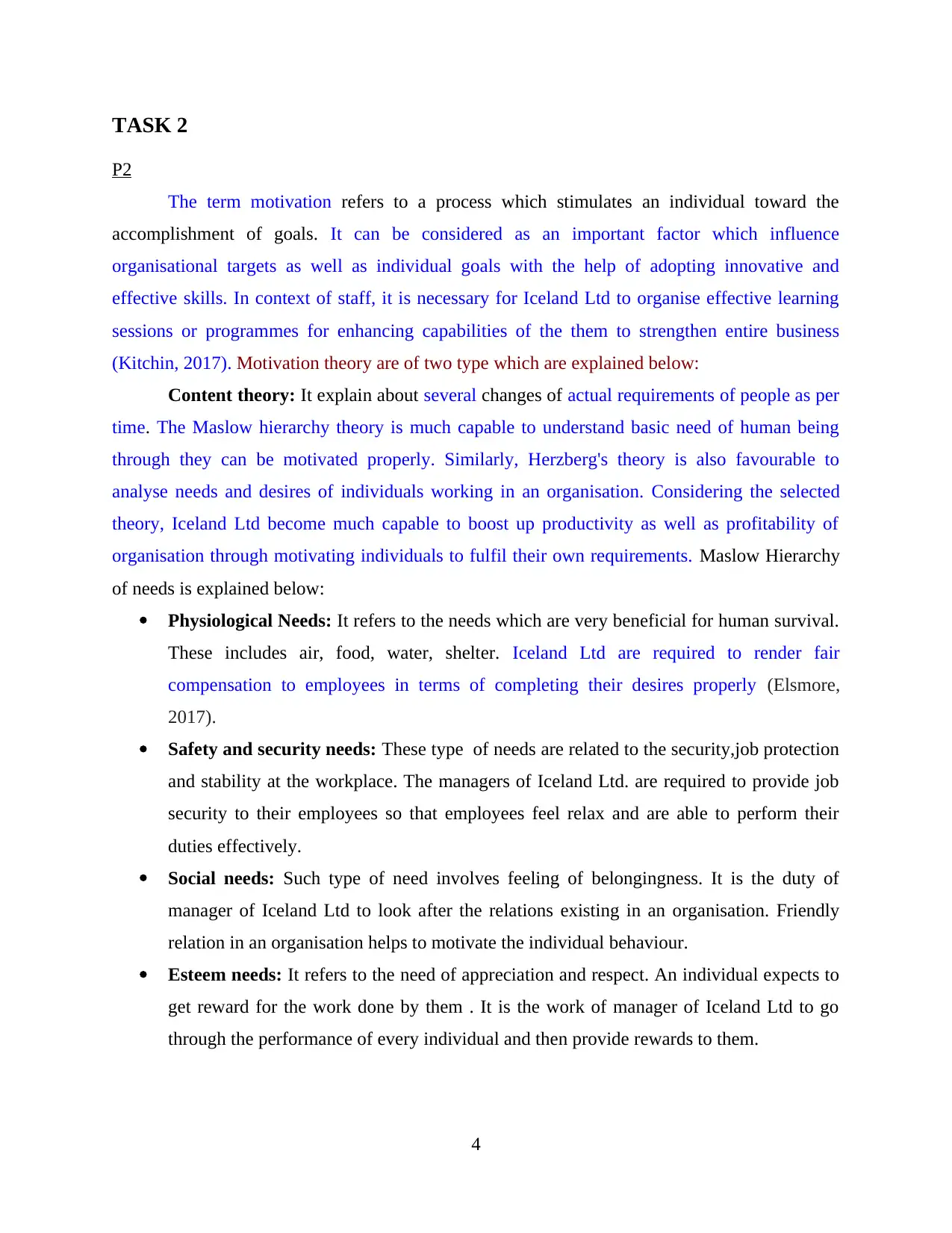
TASK 2
P2
The term motivation refers to a process which stimulates an individual toward the
accomplishment of goals. It can be considered as an important factor which influence
organisational targets as well as individual goals with the help of adopting innovative and
effective skills. In context of staff, it is necessary for Iceland Ltd to organise effective learning
sessions or programmes for enhancing capabilities of the them to strengthen entire business
(Kitchin, 2017). Motivation theory are of two type which are explained below:
Content theory: It explain about several changes of actual requirements of people as per
time. The Maslow hierarchy theory is much capable to understand basic need of human being
through they can be motivated properly. Similarly, Herzberg's theory is also favourable to
analyse needs and desires of individuals working in an organisation. Considering the selected
theory, Iceland Ltd become much capable to boost up productivity as well as profitability of
organisation through motivating individuals to fulfil their own requirements. Maslow Hierarchy
of needs is explained below:
Physiological Needs: It refers to the needs which are very beneficial for human survival.
These includes air, food, water, shelter. Iceland Ltd are required to render fair
compensation to employees in terms of completing their desires properly (Elsmore,
2017).
Safety and security needs: These type of needs are related to the security,job protection
and stability at the workplace. The managers of Iceland Ltd. are required to provide job
security to their employees so that employees feel relax and are able to perform their
duties effectively.
Social needs: Such type of need involves feeling of belongingness. It is the duty of
manager of Iceland Ltd to look after the relations existing in an organisation. Friendly
relation in an organisation helps to motivate the individual behaviour.
Esteem needs: It refers to the need of appreciation and respect. An individual expects to
get reward for the work done by them . It is the work of manager of Iceland Ltd to go
through the performance of every individual and then provide rewards to them.
4
P2
The term motivation refers to a process which stimulates an individual toward the
accomplishment of goals. It can be considered as an important factor which influence
organisational targets as well as individual goals with the help of adopting innovative and
effective skills. In context of staff, it is necessary for Iceland Ltd to organise effective learning
sessions or programmes for enhancing capabilities of the them to strengthen entire business
(Kitchin, 2017). Motivation theory are of two type which are explained below:
Content theory: It explain about several changes of actual requirements of people as per
time. The Maslow hierarchy theory is much capable to understand basic need of human being
through they can be motivated properly. Similarly, Herzberg's theory is also favourable to
analyse needs and desires of individuals working in an organisation. Considering the selected
theory, Iceland Ltd become much capable to boost up productivity as well as profitability of
organisation through motivating individuals to fulfil their own requirements. Maslow Hierarchy
of needs is explained below:
Physiological Needs: It refers to the needs which are very beneficial for human survival.
These includes air, food, water, shelter. Iceland Ltd are required to render fair
compensation to employees in terms of completing their desires properly (Elsmore,
2017).
Safety and security needs: These type of needs are related to the security,job protection
and stability at the workplace. The managers of Iceland Ltd. are required to provide job
security to their employees so that employees feel relax and are able to perform their
duties effectively.
Social needs: Such type of need involves feeling of belongingness. It is the duty of
manager of Iceland Ltd to look after the relations existing in an organisation. Friendly
relation in an organisation helps to motivate the individual behaviour.
Esteem needs: It refers to the need of appreciation and respect. An individual expects to
get reward for the work done by them . It is the work of manager of Iceland Ltd to go
through the performance of every individual and then provide rewards to them.
4
⊘ This is a preview!⊘
Do you want full access?
Subscribe today to unlock all pages.

Trusted by 1+ million students worldwide
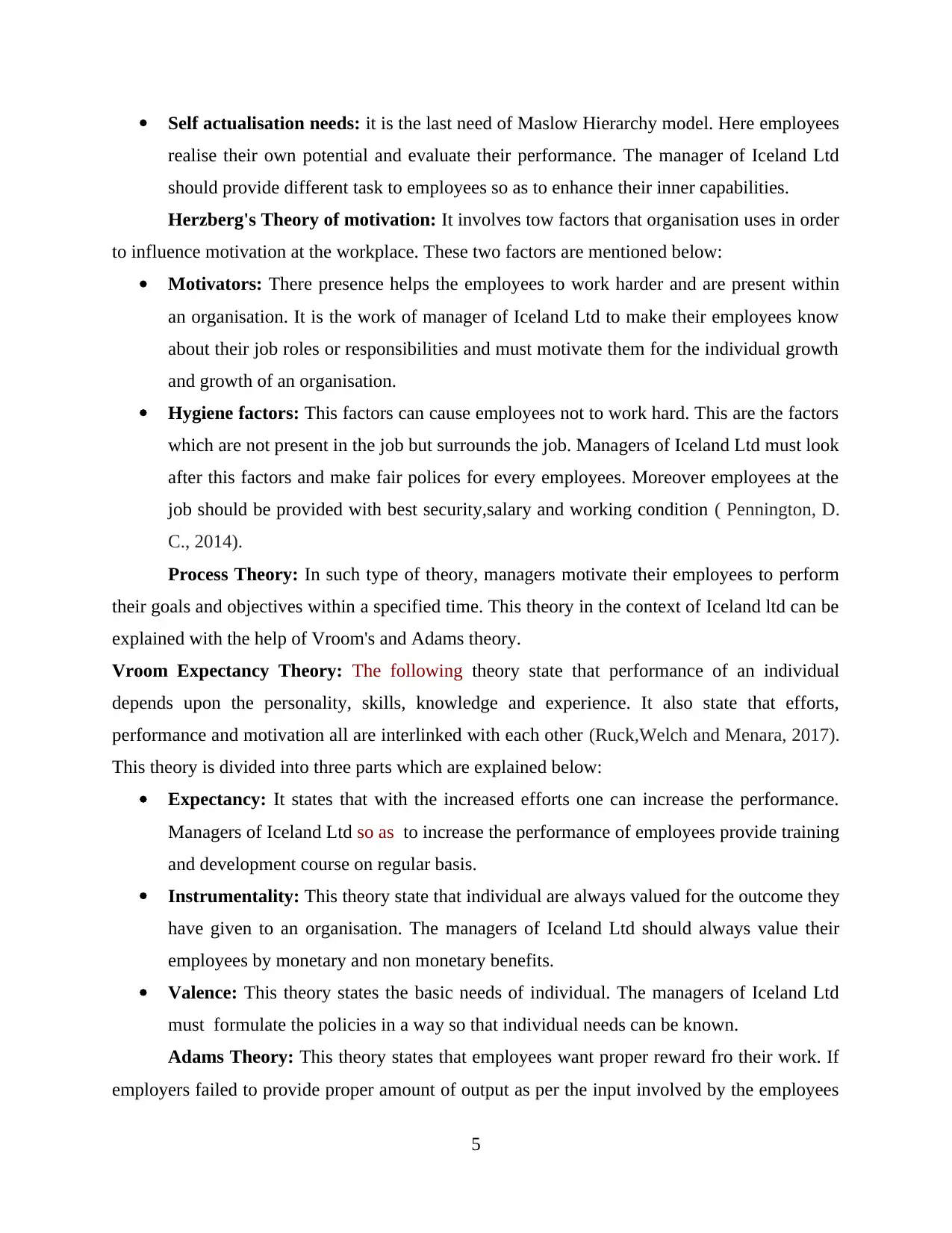
Self actualisation needs: it is the last need of Maslow Hierarchy model. Here employees
realise their own potential and evaluate their performance. The manager of Iceland Ltd
should provide different task to employees so as to enhance their inner capabilities.
Herzberg's Theory of motivation: It involves tow factors that organisation uses in order
to influence motivation at the workplace. These two factors are mentioned below:
Motivators: There presence helps the employees to work harder and are present within
an organisation. It is the work of manager of Iceland Ltd to make their employees know
about their job roles or responsibilities and must motivate them for the individual growth
and growth of an organisation.
Hygiene factors: This factors can cause employees not to work hard. This are the factors
which are not present in the job but surrounds the job. Managers of Iceland Ltd must look
after this factors and make fair polices for every employees. Moreover employees at the
job should be provided with best security,salary and working condition ( Pennington, D.
C., 2014).
Process Theory: In such type of theory, managers motivate their employees to perform
their goals and objectives within a specified time. This theory in the context of Iceland ltd can be
explained with the help of Vroom's and Adams theory.
Vroom Expectancy Theory: The following theory state that performance of an individual
depends upon the personality, skills, knowledge and experience. It also state that efforts,
performance and motivation all are interlinked with each other (Ruck,Welch and Menara, 2017).
This theory is divided into three parts which are explained below:
Expectancy: It states that with the increased efforts one can increase the performance.
Managers of Iceland Ltd so as to increase the performance of employees provide training
and development course on regular basis.
Instrumentality: This theory state that individual are always valued for the outcome they
have given to an organisation. The managers of Iceland Ltd should always value their
employees by monetary and non monetary benefits.
Valence: This theory states the basic needs of individual. The managers of Iceland Ltd
must formulate the policies in a way so that individual needs can be known.
Adams Theory: This theory states that employees want proper reward fro their work. If
employers failed to provide proper amount of output as per the input involved by the employees
5
realise their own potential and evaluate their performance. The manager of Iceland Ltd
should provide different task to employees so as to enhance their inner capabilities.
Herzberg's Theory of motivation: It involves tow factors that organisation uses in order
to influence motivation at the workplace. These two factors are mentioned below:
Motivators: There presence helps the employees to work harder and are present within
an organisation. It is the work of manager of Iceland Ltd to make their employees know
about their job roles or responsibilities and must motivate them for the individual growth
and growth of an organisation.
Hygiene factors: This factors can cause employees not to work hard. This are the factors
which are not present in the job but surrounds the job. Managers of Iceland Ltd must look
after this factors and make fair polices for every employees. Moreover employees at the
job should be provided with best security,salary and working condition ( Pennington, D.
C., 2014).
Process Theory: In such type of theory, managers motivate their employees to perform
their goals and objectives within a specified time. This theory in the context of Iceland ltd can be
explained with the help of Vroom's and Adams theory.
Vroom Expectancy Theory: The following theory state that performance of an individual
depends upon the personality, skills, knowledge and experience. It also state that efforts,
performance and motivation all are interlinked with each other (Ruck,Welch and Menara, 2017).
This theory is divided into three parts which are explained below:
Expectancy: It states that with the increased efforts one can increase the performance.
Managers of Iceland Ltd so as to increase the performance of employees provide training
and development course on regular basis.
Instrumentality: This theory state that individual are always valued for the outcome they
have given to an organisation. The managers of Iceland Ltd should always value their
employees by monetary and non monetary benefits.
Valence: This theory states the basic needs of individual. The managers of Iceland Ltd
must formulate the policies in a way so that individual needs can be known.
Adams Theory: This theory states that employees want proper reward fro their work. If
employers failed to provide proper amount of output as per the input involved by the employees
5
Paraphrase This Document
Need a fresh take? Get an instant paraphrase of this document with our AI Paraphraser
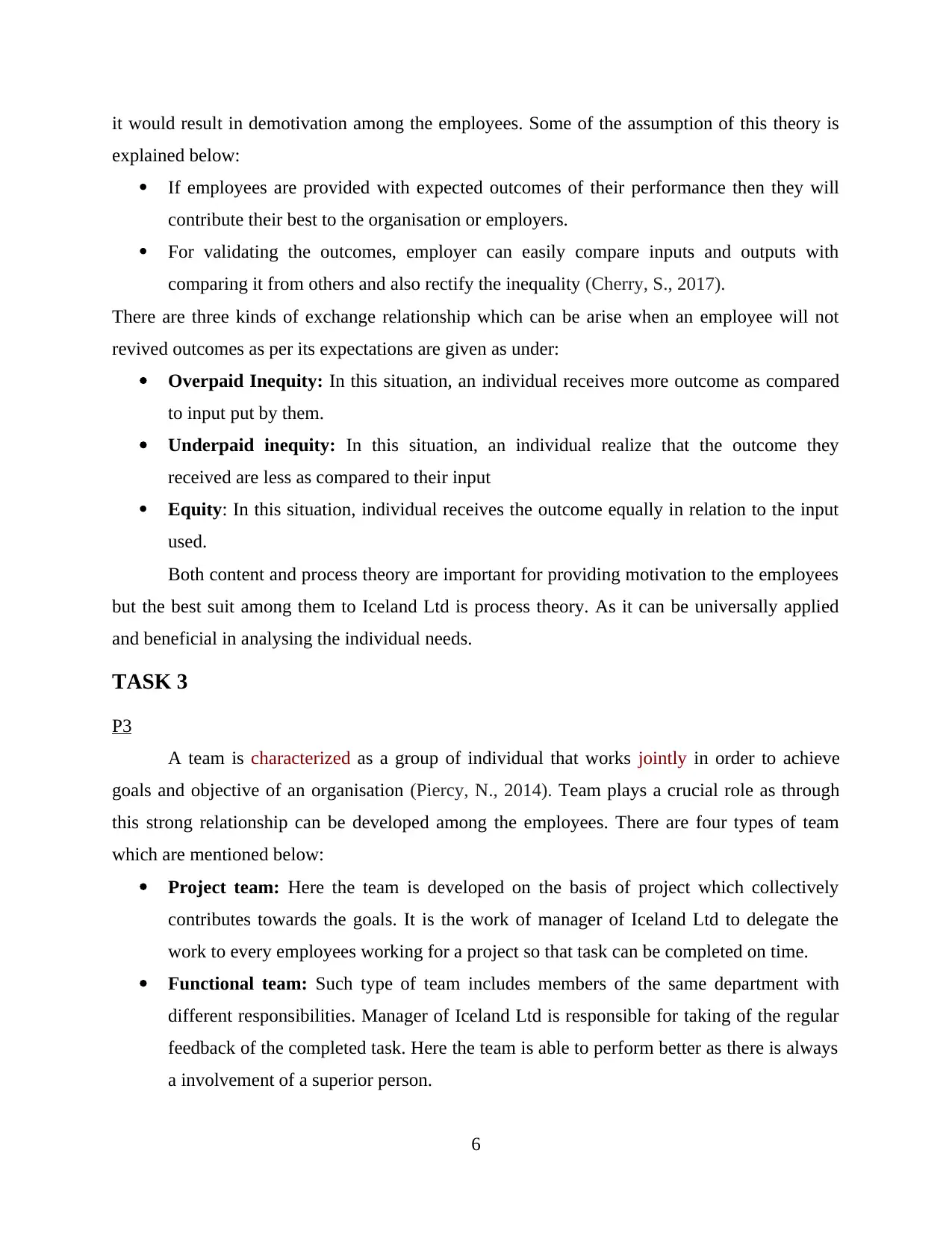
it would result in demotivation among the employees. Some of the assumption of this theory is
explained below:
If employees are provided with expected outcomes of their performance then they will
contribute their best to the organisation or employers.
For validating the outcomes, employer can easily compare inputs and outputs with
comparing it from others and also rectify the inequality (Cherry, S., 2017).
There are three kinds of exchange relationship which can be arise when an employee will not
revived outcomes as per its expectations are given as under:
Overpaid Inequity: In this situation, an individual receives more outcome as compared
to input put by them.
Underpaid inequity: In this situation, an individual realize that the outcome they
received are less as compared to their input
Equity: In this situation, individual receives the outcome equally in relation to the input
used.
Both content and process theory are important for providing motivation to the employees
but the best suit among them to Iceland Ltd is process theory. As it can be universally applied
and beneficial in analysing the individual needs.
TASK 3
P3
A team is characterized as a group of individual that works jointly in order to achieve
goals and objective of an organisation (Piercy, N., 2014). Team plays a crucial role as through
this strong relationship can be developed among the employees. There are four types of team
which are mentioned below:
Project team: Here the team is developed on the basis of project which collectively
contributes towards the goals. It is the work of manager of Iceland Ltd to delegate the
work to every employees working for a project so that task can be completed on time.
Functional team: Such type of team includes members of the same department with
different responsibilities. Manager of Iceland Ltd is responsible for taking of the regular
feedback of the completed task. Here the team is able to perform better as there is always
a involvement of a superior person.
6
explained below:
If employees are provided with expected outcomes of their performance then they will
contribute their best to the organisation or employers.
For validating the outcomes, employer can easily compare inputs and outputs with
comparing it from others and also rectify the inequality (Cherry, S., 2017).
There are three kinds of exchange relationship which can be arise when an employee will not
revived outcomes as per its expectations are given as under:
Overpaid Inequity: In this situation, an individual receives more outcome as compared
to input put by them.
Underpaid inequity: In this situation, an individual realize that the outcome they
received are less as compared to their input
Equity: In this situation, individual receives the outcome equally in relation to the input
used.
Both content and process theory are important for providing motivation to the employees
but the best suit among them to Iceland Ltd is process theory. As it can be universally applied
and beneficial in analysing the individual needs.
TASK 3
P3
A team is characterized as a group of individual that works jointly in order to achieve
goals and objective of an organisation (Piercy, N., 2014). Team plays a crucial role as through
this strong relationship can be developed among the employees. There are four types of team
which are mentioned below:
Project team: Here the team is developed on the basis of project which collectively
contributes towards the goals. It is the work of manager of Iceland Ltd to delegate the
work to every employees working for a project so that task can be completed on time.
Functional team: Such type of team includes members of the same department with
different responsibilities. Manager of Iceland Ltd is responsible for taking of the regular
feedback of the completed task. Here the team is able to perform better as there is always
a involvement of a superior person.
6
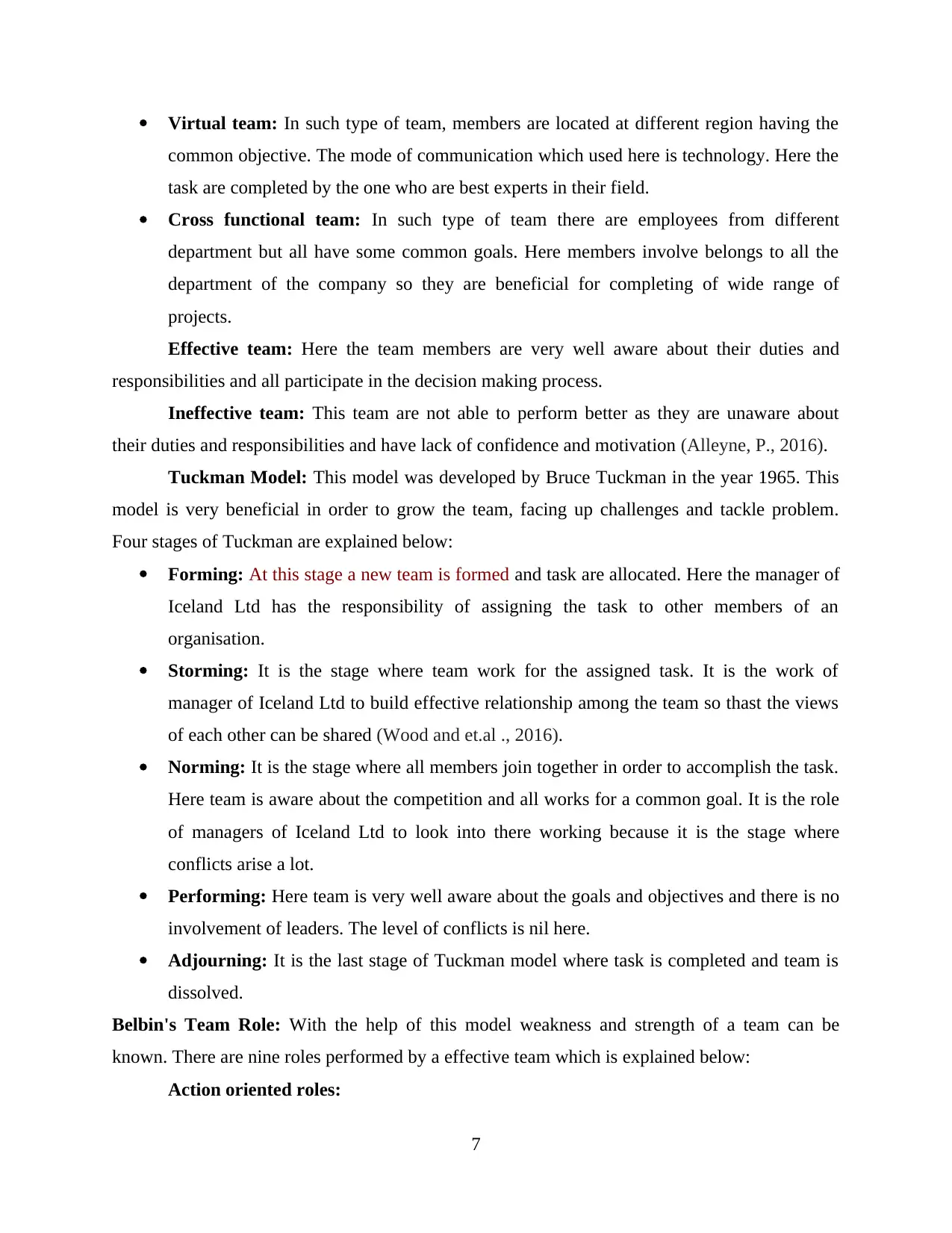
Virtual team: In such type of team, members are located at different region having the
common objective. The mode of communication which used here is technology. Here the
task are completed by the one who are best experts in their field.
Cross functional team: In such type of team there are employees from different
department but all have some common goals. Here members involve belongs to all the
department of the company so they are beneficial for completing of wide range of
projects.
Effective team: Here the team members are very well aware about their duties and
responsibilities and all participate in the decision making process.
Ineffective team: This team are not able to perform better as they are unaware about
their duties and responsibilities and have lack of confidence and motivation (Alleyne, P., 2016).
Tuckman Model: This model was developed by Bruce Tuckman in the year 1965. This
model is very beneficial in order to grow the team, facing up challenges and tackle problem.
Four stages of Tuckman are explained below:
Forming: At this stage a new team is formed and task are allocated. Here the manager of
Iceland Ltd has the responsibility of assigning the task to other members of an
organisation.
Storming: It is the stage where team work for the assigned task. It is the work of
manager of Iceland Ltd to build effective relationship among the team so thast the views
of each other can be shared (Wood and et.al ., 2016).
Norming: It is the stage where all members join together in order to accomplish the task.
Here team is aware about the competition and all works for a common goal. It is the role
of managers of Iceland Ltd to look into there working because it is the stage where
conflicts arise a lot.
Performing: Here team is very well aware about the goals and objectives and there is no
involvement of leaders. The level of conflicts is nil here.
Adjourning: It is the last stage of Tuckman model where task is completed and team is
dissolved.
Belbin's Team Role: With the help of this model weakness and strength of a team can be
known. There are nine roles performed by a effective team which is explained below:
Action oriented roles:
7
common objective. The mode of communication which used here is technology. Here the
task are completed by the one who are best experts in their field.
Cross functional team: In such type of team there are employees from different
department but all have some common goals. Here members involve belongs to all the
department of the company so they are beneficial for completing of wide range of
projects.
Effective team: Here the team members are very well aware about their duties and
responsibilities and all participate in the decision making process.
Ineffective team: This team are not able to perform better as they are unaware about
their duties and responsibilities and have lack of confidence and motivation (Alleyne, P., 2016).
Tuckman Model: This model was developed by Bruce Tuckman in the year 1965. This
model is very beneficial in order to grow the team, facing up challenges and tackle problem.
Four stages of Tuckman are explained below:
Forming: At this stage a new team is formed and task are allocated. Here the manager of
Iceland Ltd has the responsibility of assigning the task to other members of an
organisation.
Storming: It is the stage where team work for the assigned task. It is the work of
manager of Iceland Ltd to build effective relationship among the team so thast the views
of each other can be shared (Wood and et.al ., 2016).
Norming: It is the stage where all members join together in order to accomplish the task.
Here team is aware about the competition and all works for a common goal. It is the role
of managers of Iceland Ltd to look into there working because it is the stage where
conflicts arise a lot.
Performing: Here team is very well aware about the goals and objectives and there is no
involvement of leaders. The level of conflicts is nil here.
Adjourning: It is the last stage of Tuckman model where task is completed and team is
dissolved.
Belbin's Team Role: With the help of this model weakness and strength of a team can be
known. There are nine roles performed by a effective team which is explained below:
Action oriented roles:
7
⊘ This is a preview!⊘
Do you want full access?
Subscribe today to unlock all pages.

Trusted by 1+ million students worldwide
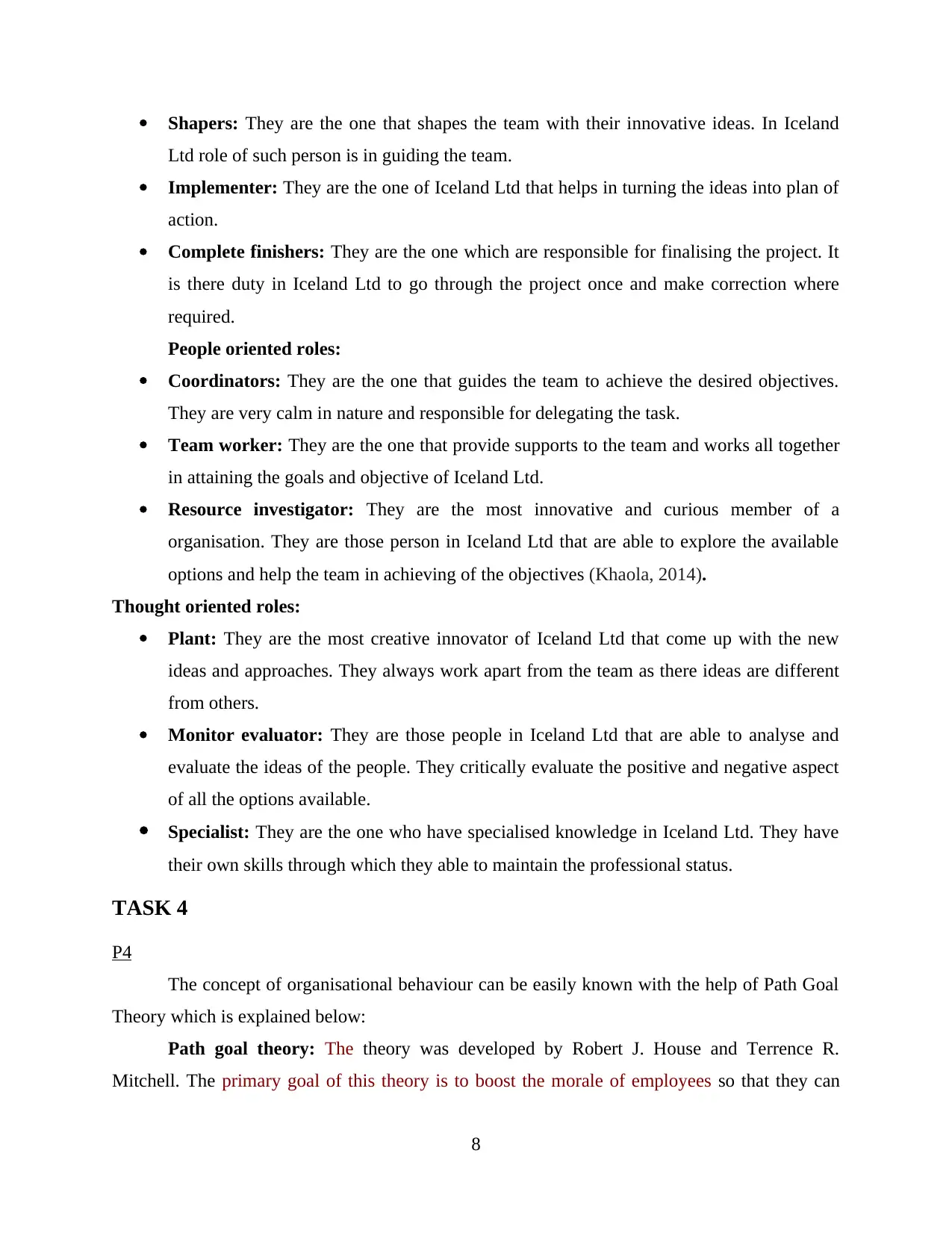
Shapers: They are the one that shapes the team with their innovative ideas. In Iceland
Ltd role of such person is in guiding the team.
Implementer: They are the one of Iceland Ltd that helps in turning the ideas into plan of
action.
Complete finishers: They are the one which are responsible for finalising the project. It
is there duty in Iceland Ltd to go through the project once and make correction where
required.
People oriented roles:
Coordinators: They are the one that guides the team to achieve the desired objectives.
They are very calm in nature and responsible for delegating the task.
Team worker: They are the one that provide supports to the team and works all together
in attaining the goals and objective of Iceland Ltd.
Resource investigator: They are the most innovative and curious member of a
organisation. They are those person in Iceland Ltd that are able to explore the available
options and help the team in achieving of the objectives (Khaola, 2014).
Thought oriented roles:
Plant: They are the most creative innovator of Iceland Ltd that come up with the new
ideas and approaches. They always work apart from the team as there ideas are different
from others.
Monitor evaluator: They are those people in Iceland Ltd that are able to analyse and
evaluate the ideas of the people. They critically evaluate the positive and negative aspect
of all the options available.
Specialist: They are the one who have specialised knowledge in Iceland Ltd. They have
their own skills through which they able to maintain the professional status.
TASK 4
P4
The concept of organisational behaviour can be easily known with the help of Path Goal
Theory which is explained below:
Path goal theory: The theory was developed by Robert J. House and Terrence R.
Mitchell. The primary goal of this theory is to boost the morale of employees so that they can
8
Ltd role of such person is in guiding the team.
Implementer: They are the one of Iceland Ltd that helps in turning the ideas into plan of
action.
Complete finishers: They are the one which are responsible for finalising the project. It
is there duty in Iceland Ltd to go through the project once and make correction where
required.
People oriented roles:
Coordinators: They are the one that guides the team to achieve the desired objectives.
They are very calm in nature and responsible for delegating the task.
Team worker: They are the one that provide supports to the team and works all together
in attaining the goals and objective of Iceland Ltd.
Resource investigator: They are the most innovative and curious member of a
organisation. They are those person in Iceland Ltd that are able to explore the available
options and help the team in achieving of the objectives (Khaola, 2014).
Thought oriented roles:
Plant: They are the most creative innovator of Iceland Ltd that come up with the new
ideas and approaches. They always work apart from the team as there ideas are different
from others.
Monitor evaluator: They are those people in Iceland Ltd that are able to analyse and
evaluate the ideas of the people. They critically evaluate the positive and negative aspect
of all the options available.
Specialist: They are the one who have specialised knowledge in Iceland Ltd. They have
their own skills through which they able to maintain the professional status.
TASK 4
P4
The concept of organisational behaviour can be easily known with the help of Path Goal
Theory which is explained below:
Path goal theory: The theory was developed by Robert J. House and Terrence R.
Mitchell. The primary goal of this theory is to boost the morale of employees so that they can
8
Paraphrase This Document
Need a fresh take? Get an instant paraphrase of this document with our AI Paraphraser
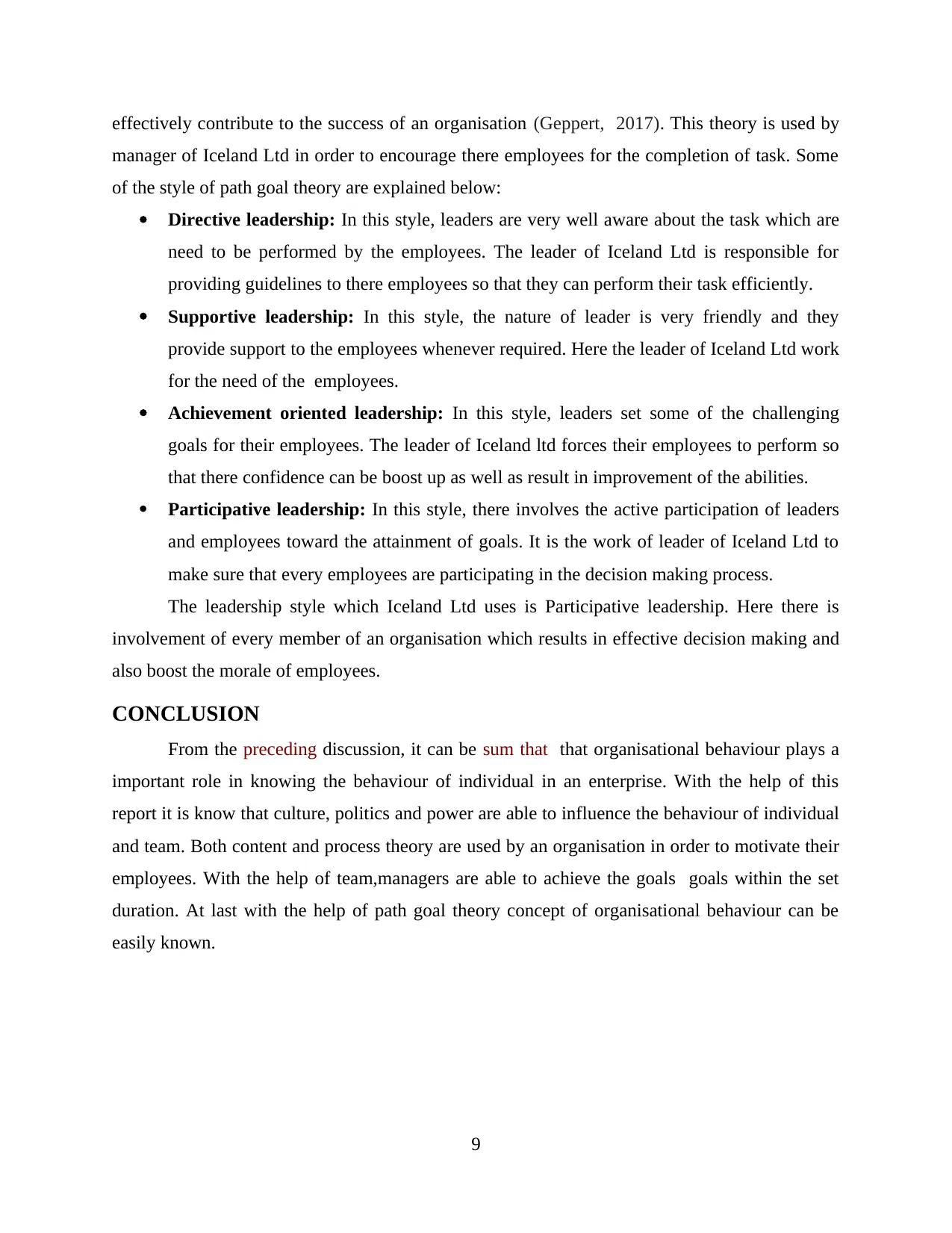
effectively contribute to the success of an organisation (Geppert, 2017). This theory is used by
manager of Iceland Ltd in order to encourage there employees for the completion of task. Some
of the style of path goal theory are explained below:
Directive leadership: In this style, leaders are very well aware about the task which are
need to be performed by the employees. The leader of Iceland Ltd is responsible for
providing guidelines to there employees so that they can perform their task efficiently.
Supportive leadership: In this style, the nature of leader is very friendly and they
provide support to the employees whenever required. Here the leader of Iceland Ltd work
for the need of the employees.
Achievement oriented leadership: In this style, leaders set some of the challenging
goals for their employees. The leader of Iceland ltd forces their employees to perform so
that there confidence can be boost up as well as result in improvement of the abilities.
Participative leadership: In this style, there involves the active participation of leaders
and employees toward the attainment of goals. It is the work of leader of Iceland Ltd to
make sure that every employees are participating in the decision making process.
The leadership style which Iceland Ltd uses is Participative leadership. Here there is
involvement of every member of an organisation which results in effective decision making and
also boost the morale of employees.
CONCLUSION
From the preceding discussion, it can be sum that that organisational behaviour plays a
important role in knowing the behaviour of individual in an enterprise. With the help of this
report it is know that culture, politics and power are able to influence the behaviour of individual
and team. Both content and process theory are used by an organisation in order to motivate their
employees. With the help of team,managers are able to achieve the goals goals within the set
duration. At last with the help of path goal theory concept of organisational behaviour can be
easily known.
9
manager of Iceland Ltd in order to encourage there employees for the completion of task. Some
of the style of path goal theory are explained below:
Directive leadership: In this style, leaders are very well aware about the task which are
need to be performed by the employees. The leader of Iceland Ltd is responsible for
providing guidelines to there employees so that they can perform their task efficiently.
Supportive leadership: In this style, the nature of leader is very friendly and they
provide support to the employees whenever required. Here the leader of Iceland Ltd work
for the need of the employees.
Achievement oriented leadership: In this style, leaders set some of the challenging
goals for their employees. The leader of Iceland ltd forces their employees to perform so
that there confidence can be boost up as well as result in improvement of the abilities.
Participative leadership: In this style, there involves the active participation of leaders
and employees toward the attainment of goals. It is the work of leader of Iceland Ltd to
make sure that every employees are participating in the decision making process.
The leadership style which Iceland Ltd uses is Participative leadership. Here there is
involvement of every member of an organisation which results in effective decision making and
also boost the morale of employees.
CONCLUSION
From the preceding discussion, it can be sum that that organisational behaviour plays a
important role in knowing the behaviour of individual in an enterprise. With the help of this
report it is know that culture, politics and power are able to influence the behaviour of individual
and team. Both content and process theory are used by an organisation in order to motivate their
employees. With the help of team,managers are able to achieve the goals goals within the set
duration. At last with the help of path goal theory concept of organisational behaviour can be
easily known.
9
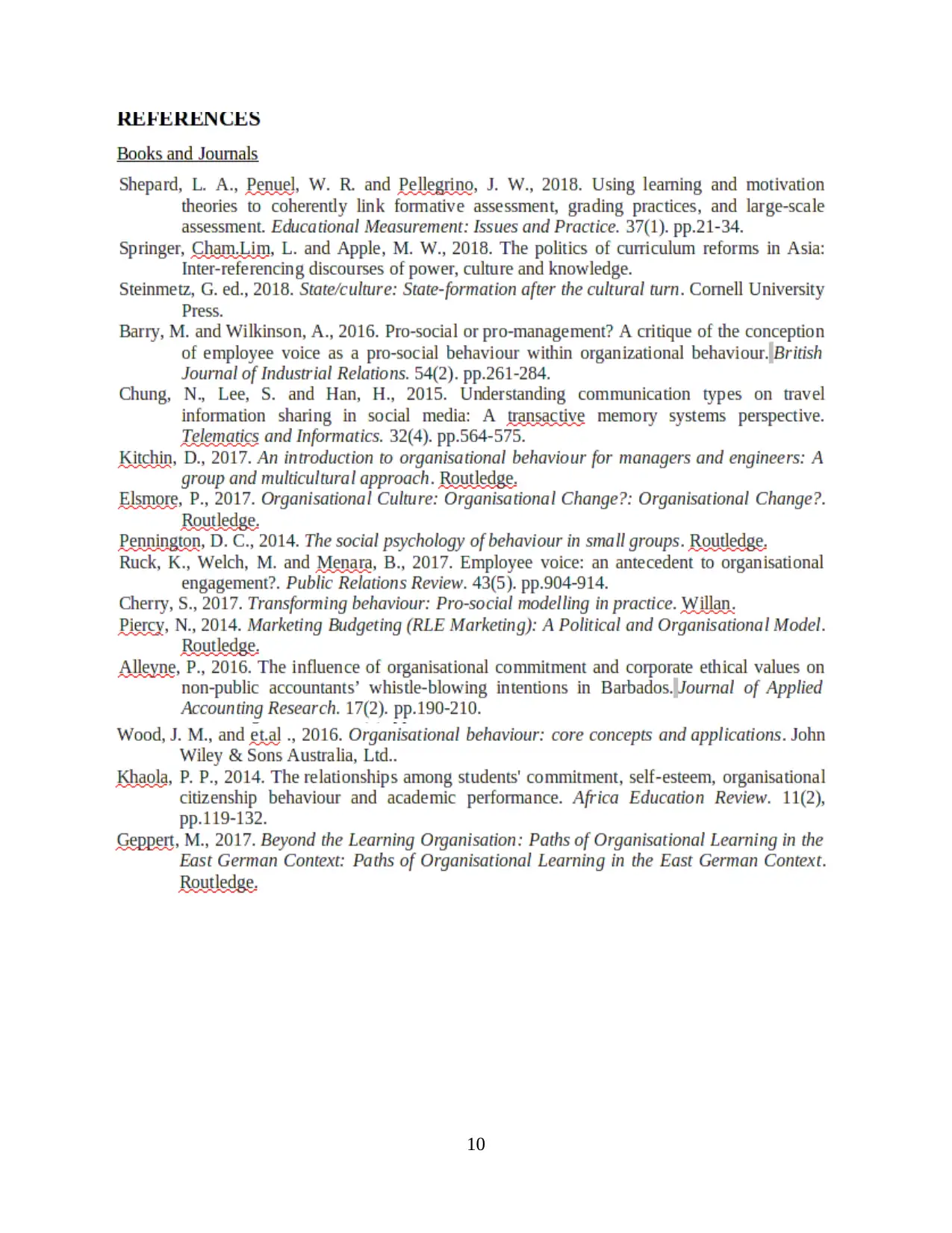
10
⊘ This is a preview!⊘
Do you want full access?
Subscribe today to unlock all pages.

Trusted by 1+ million students worldwide
1 out of 12
Related Documents
Your All-in-One AI-Powered Toolkit for Academic Success.
+13062052269
info@desklib.com
Available 24*7 on WhatsApp / Email
![[object Object]](/_next/static/media/star-bottom.7253800d.svg)
Unlock your academic potential
Copyright © 2020–2026 A2Z Services. All Rights Reserved. Developed and managed by ZUCOL.



